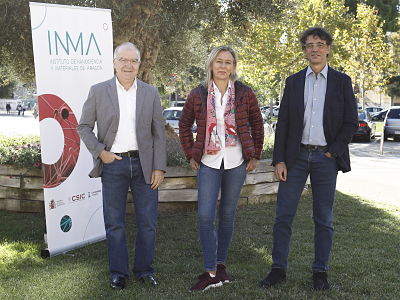A new European infrastructure to facilitate the transfer of nanodrugs from the laboratory to clinical practice
Researchers at the Consejo Superior de Investigaciones Científicas (CSIC) are participating in a major European project, worth almost 15 million euros, to create a new infrastructure to facilitate the transfer of nanodrugs from research centres to clinical practice.
The aim of the project, called Phoenix, is to provide services for the development, characterisation, testing, safety assessment, scale-up, GMP (Good Manufacturing Practice) production and commercialisation of nanodrugs on the market, so that they can be made available to SMEs, start-ups, research laboratories and any other interested user.
The initiative involves researchers from the Institute of Nanoscience and Materials of Aragon, a joint centre of CSIC and the University of Zaragoza, INMA (CSIC-University of Zaragoza), the Institute of Materials Science of Barcelona, ICMAB (CSIC) and the ICMAB-CSIC spin-off, Nanomol Technologies S.L. A total of 11 partners from academia and industry across Europe are part of this “open innovation testbed” for nanodrugs, which will be completed in 2025.
Nanodrugs are medicines that use nanotechnology – the use of matter at the atomic, molecular and supramolecular scale for industrial purposes – in some form. Examples include contrast agents in the form of nanoparticles, which offer high stability and permanence in blood, or nanocarriers, which can encapsulate a drug and protect it, improving its absorption and distribution.
Successful application of these advances requires the establishment of good manufacturing practices that allow large-scale transfer of nanodrugs from the laboratory to the patient. Due to the lack of resources to implement on-site GMP manufacturing, the production of innovative nanodrugs remains a challenge for key players in the EU nanomedicine market, such as start-ups and SMEs. “The proper application of nanodrugs urgently requires the establishment of an open innovation test bed (OITB), based on European science and regulation,” says Jesús Martínez de la Fuente, researcher at INMA-CSIC-UNIZAR.
PHOENIX: key project to bring nanodrugs from the lab to the market
Phoenix project aims to enable the transfer of nanodrugs from the laboratory to clinical trials in a seamless, timely and cost-effective manner, providing the necessary open innovation test bed (OITB). Phoenix-OITB will develop new and upgrade existing facilities to make them available to SMEs, start-ups and research laboratories for scale-up, GMP production and characterisation of nanopharmaceuticals.
The services and expertise to be provided by this OITB will include GMP production and characterisation, safety assessment, regulatory compliance and boosting commercialisation. “Our goal is to create a new European-wide infrastructure accessible to all research centres, SMEs and start-ups, to facilitate the transfer of nanodrugs from the laboratory to clinical practice,” explains Martínez de la Fuente. “The role of INMA and ICMAB is mainly to develop new services, open to all types of users, to characterise these nanodrugs and guarantee their quality,” adds Nora Ventosa, a scientist at ICMAB-CSIC.
Project partners
The Phoenix project is led by the Luxembourg Institute of Science and Technology (LIST) and has the support of the German SME MyBiotech in the scientific coordination. It will run for 48 months, starting on 1 March 2021, with a total budget of 14.45 million euros and a requested EU contribution of 11.1 million euros.
The 11 partners forming the Phoenix consortium are the Luxembourg Institute of Science and Technology (LIST, Luxembourg), MyBiotech (SME from Germany), Nanomol Technologies SL, LeanBio SL and Grace Bio SL (SMEs from Spain), Cenya Imaging B.V. (SME from the Netherlands) and the European Commission (SME from the Netherlands). (SME from the Netherlands), BioNanoNet Forschungsgesellschaft mbH (BNN, Austria), CSIC (INMA, CSIC-UNIZAR and ICMAB, CSIC), Institute for Medical Research and Occupational Health (IMROH, Croatia), Research Center Pharmaceutical Engineering GmbH (RCPE, Austria) and Topas Therapeutics GmbH (Germany).
25/03/2021










